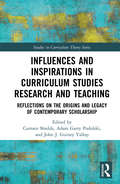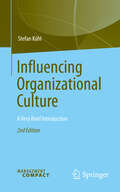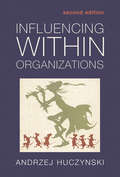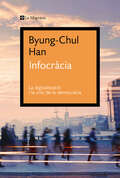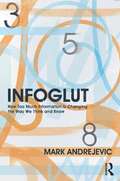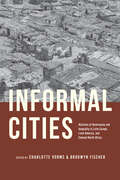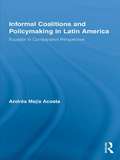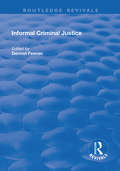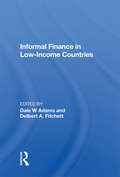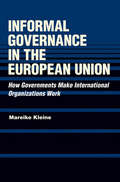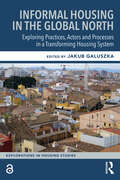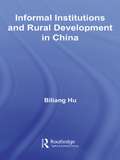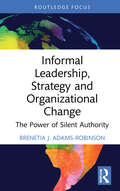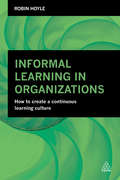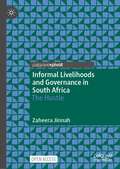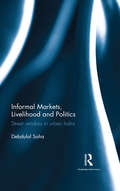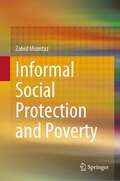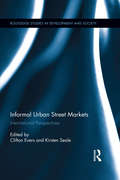- Table View
- List View
Influencer Marketing for Brands: What YouTube and Instagram Can Teach You About the Future of Digital Advertising
by Aron LevinIn the next few years, brands are on track to spend billions of dollars on influencer marketing. This form of marketing—currently utilized with great success on Instagram and YouTube—is not a short-lived fad, but a tectonic shift for the future of digital advertising. It's the way of the future, and the responsibility is on business leaders to keep up.Modern marketing professionals looking to adopt influencer marketing for their brands face equally modern challenges. Like finding the right talent, tracking and measuring results and quantifying how this new marketing opportunity aligns with the overall strategy. Influencer Marketing for Brands is the field guide for the digital age. After working with hundreds of brands from across the globe, author Aron Levin shares his insider knowledge gained from research, strategy, and hands-on experience from more than 10,000 successful collaborations with influencers on Instagram and YouTube. He provides you with valuable insights that help you eliminate guesswork and avoid common mistakes. More importantly, he shows you how to turn influencer marketing into a scalable and sustainable marketing channel. The digital media landscape grows more complicated by the hour, and influencer marketing is no exception. Influencer Marketing for Brands breaks down the art and science of influencer marketing and helps you synthesize, contextualize and transform this new way of creating and distributing content with powerful formulas, proven strategies, and real-world examples.What You Will LearnPlan effective influencer marketing campaigns using a simple 3-step formulaCreate top performing YouTube videos that drive website traffic, app installs and salesUnderstand what to pay for influencer marketing and how much you should invest if you're just starting out Who This Book is ForMarketing and agency professionals, influencers and content creators, marketing students, those who are looking for more effective forms of advertising and are generally interested in understanding the new and evolving digital media landscape.
Influencer: The Science Behind Swaying Others
by Helen Katz T. Bettina CornwellThe influential are no longer only those with celebrity status – but until now there has been no authoritative resource on the theory and practice of influencer marketing. This book will educate and inspire decision makers, researchers, students, and influencers themselves. Diving deeper than the many "how-to" books on the influencer phenomenon, this book brings in frameworks from marketing, sociology, psychology, and communication studies to redefine the influencer as a persona (related to a person, group of people, or organization) that possesses greater than average sway over others. Cornwell and Katz go on to: introduce the influencers, macro and nano, authentic and inauthentic, ascending and fading; consider their relationship to brands in the marketing ecosystem, along with regulations that set limits on influencer marketing; describe how influence is measured and evaluated and look into the future; and bring together the latest research on influencer marketing and organize it for the reader. The book serves both those who want to understand the science behind influencer marketing and those who want to most effectively employ influencers in brand strategy. Instructors, students, and professionals will appreciate international examples from multiple industries applying theories to the real world.
Influencer: The Science Behind Swaying Others
by Helen Katz T. Bettina CornwellThe influential are no longer only those with celebrity status – but until now there has been no authoritative resource on the theory and practice of influencer marketing. This book will educate and inspire decision makers, researchers, students, and influencers themselves. Diving deeper than the many "how-to" books on the influencer phenomenon, this book brings in frameworks from marketing, sociology, psychology, and communication studies to redefine the influencer as a persona (related to a person, group of people, or organization) that possesses greater than average sway over others. Cornwell and Katz go on to: introduce the influencers, macro and nano, authentic and inauthentic, ascending and fading; consider their relationship to brands in the marketing ecosystem, along with regulations that set limits on influencer marketing; describe how influence is measured and evaluated and look into the future; and bring together the latest research on influencer marketing and organize it for the reader. The book serves both those who want to understand the science behind influencer marketing and those who want to most effectively employ influencers in brand strategy. Instructors, students, and professionals will appreciate international examples from multiple industries applying theories to the real world.The Open Access version of this book, available at http://www.taylorfrancis.com, has been made available under a Creative Commons [Attribution-Non Commercial-No Derivatives (CC-BY-NC-ND)] 4.0 license.
Influences and Inspirations in Curriculum Studies Research and Teaching: Reflections on the Origins and Legacy of Contemporary Scholarship (Studies in Curriculum Theory Series)
by Carmen Shields Adam Garry Podolski John J. Guiney YallopThis volume highlights lived experiences, personal inspirations and motivations, which have generated scholarship, and influenced the research and teaching of scholars in the field of curriculum studies. Offering contributions from new, established and experienced scholars, chapters foreground the ways in which the authors have been influenced by the mentorship and work of others, by personal challenges, and by the contexts in which they live and work. Chapters also illustrate how scholars have engaged in variety of methodological and autobiographical processes including narrative and poetic inquiry, autoethnography and visual arts research. Through a range of contributions, the book clarifies the origins and legacy of contemporary curriculum studies and in doing so, provides inspiration for beginning scholars and academics as they continue to find their voices in academic communities. Offering rich insight into the experiences and scholarship of a wide range of scholars, this volume will be of interest to students, scholars and researchers with an interest in curriculum studies, as well as educational research and methodologies more broadly.
Influencing Organizational Culture: A Very Brief Introduction
by Stefan KühlIn the management discourse few words are thrown about more carelessly than &‘organizational culture&’. While the term is usually defined too broadly—including such phenomena as assumptions, values, traditions, articles of faith, myths and artifacts—this book applies a far more narrow concept. Organizational culture, or the informal structure of an organization, is a term used to describe the behavioral expectations in an organization that have not been decided on in a formal way but that evolved by means of repetition and imitation. This book shows how this narrow definition makes it possible to more precisely observe and understand an organization&’s culture and its changes. Management&’s only way for influencing organizational culture—and this may sound paradoxical at first—is to change the organization&’s formal structure as for example its incentive schemes, goal-setting processes, strategic directions or hierarchy.
Influencing Shopper Decisions: Unleash the Power of Your Brand to Win Customers
by Rebecca Brooks Devora RogersShould I advertise on TV? Is print dead? Should I work with an influencer? Should I promote my product through Facebook and Instagram ads? What about TikTok? How do brands get shoppers to say "yes" in an increasingly complex, fragmented and fast-changing world?Constant change, rapid innovation, category disruptors, rising shopper expectations and new access to goods and services have made consumers and shoppers incredibly adept at wading through oceans of research and information. Before making a purchase decision, your brand's target consumer is a shopper. With more choices than ever before, shoppers are becoming increasingly promiscuous, opening themselves up to new brands, products and shopping channels. In Influencing Shopper Decisions, the authors are market researchers who reveal how brands can help shoppers say "yes" by better understanding consumer decision-making.By tracking the evolution of the shopper mindset from the First Moment of Truth to Google's infamous ZMOT, the authors outline a new paradigm for shopping behavior that focuses on shopper needs, priorities and context. Whether you're a CPG brand marketer, digital media company or small business owner, Influencing Shopper Decisions provides an unparalleled understanding of the shopper mindset and the keys to unlocking it. After explaining the forces that drive consumer decision-making, the authors outline key insights and strategies that marketers can use to maintain relevancy and grow engagement with consumers.
Influencing Within Organizations: A Guide To The Important Process Of Influencing Within Organizations
by Andzrej HuczynskiThis unique book provides readers with vital information on one of the most important survival-success skill of the twenty-first century - influencing. By bringing the most consistent and dependable academic studies to light, and translating their conclusions into specific, behavioural steps, it gives readers an effective practical guide to success
Influential Internal Communication: Streamline Your Corporate Communication to Drive Efficiency and Engagement
by Jenni FieldStreamline your organization's communication with the powerful and easy-to-follow methodology presented in this book, featuring insight from experts including Simon Sinek and Brené Brown. Better communication will mean better business practice company-wide as well as increased employee engagement, happier clients and customers, and stronger profits.As the title suggests, Influential Internal Communication proves just how influential internal communications (IC) is, and the measurable impact it has on an organization's growth. For many organizations, IC often slips down the list of priorities when there are high pressure, high stakes business situations to cope with. This causes a sense of chaos and confusion within the organization that will - eventually - permeate to external customers and clients. Influential Internal Communication presents a clear, adaptable methodology that will help readers understand, diagnose and fix their own communication challenges, thereby transforming the chaos into calm.Backed up with data and statistics from industry reports on workplace culture, Influential Internal Communication is based on The Field Model and draws on research with CEO's, some of the best insights into people, organisations and chaos. The theory is backed up with real world case studies, showing how chaos can impact a range of organizations of varying size and industry. Written by the 2020 President of the Chartered Institute of Public Relations (CIPR), Influential Internal Communication will streamline any organization's IC practices, and help to drive engagement, efficiency and profit across the board.
Infocracia: La digitalización y la crisis de la democracia
by Byung-Chul HanUn análisis sagaz del régimen de la información, el nuevo gobierno al que estamos sometidos, por el filósofo más leído del siglo XXI. La digitalización avanza inexorablemente. Aturdidos por el frenesí de la comunicación y la información, nos sentimos impotentes ante el tsunami de datos que despliega fuerzas destructivas y deformantes. Hoy la digitalización también afecta a la esfera política y provoca graves trastornos en el proceso democrático. Las campañas electorales son guerras de información que se libran con todos los medios técnicos y psicológicos imaginables. Los bots -las cuentas falsas automatizadas en las redes sociales- difunden noticias falsas y discursos de odio e influyen en la formación de la opinión pública. Los ejércitos de trolls intervienen en las campañas apuntalando la desinformación. Las teorías de la conspiración y la propaganda dominan el debate político. Por medio de la psicometría y la psicopolítica digital, se intenta influir en el comportamiento electoral y evitar las decisiones conscientes. El nuevo ensayo de Byung-Chul Han describe la crisis de la democracia y la atribuye al cambio estructural de la esfera pública en el mundo digital. También le da un nombre a este fenómeno: infocracia.
Infocràcia: La digitalització i la crisi de la democràcia
by Byung-Chul HanUna anàlisi sagaç del règim de la informació, el nou govern a què estem sotmesos, pel filòsof més llegit del segle XXI. La digitalització avança inexorablement. Atordits pel frenesí de la comunicació i la informació, ens sentim impotents davant del tsunami de dades que desplega forces destructives i deformants. La digitalització també afecta l'esfera política i provoca greus trastorns en el procés democràtic. Les campanyes electorals són guerres dinformació que es lliuren amb tots els mitjans tècnics i psicològics imaginables.Els bots —els comptes falsos automatitzats a les xarxes socials— difonen notícies falses i discursos d'odi i influeixen en la formació de l'opinió pública. Els exèrcits de trolls intervenen en les campanyes apuntalant la desinformació. Les teories de la conspiració i la propaganda dominen el debat polític. Per mitjà de la psicometria i la psicopolítica digital s'intenta influir en el comportament electoral i evitar les decisions conscients. El nou assaig de Byung-Chul Han descriu la crisi de la democràcia i l'atribueix al canvi estructural de l'esfera pública al món digital. També dóna un nom a aquest fenomen: infocràcia.
Infodemic Disorder: Covid-19 Coping Strategies in Europe, Canada and Mexico
by Gevisa La Rocca Marie-Eve Carignan Giovanni Boccia ArtieriThis contributed volume identifies how the information processes of public institutions and citizens have changed throughout the COVID-19 pandemic, within a new context that emerged: the infodemic disorder. Public debate is largely characterized today by a crisis of the legitimacy of institutions, accompanied by a crisis of authority in public communication, leading to the emergency of a state of information disorder due specifically to the need to find information related to the coping of the pandemic. This condition is characterized by growing attention to issues related to ‘fake news’, ‘misinformation’, and ‘media manipulation’, that are intertwined in digital platform ecosystems, and the effects of which on democracy, public communication and research, and the sharing of information in the civic sphere are broad and far-reaching. This volume analyzes the links between communication strategies of public institutions, and the resulting citizen communication, in an attempt to tease out how communication processes have changed during the pandemic. It was decided to investigate this infodemic disorder as it appeared in three different geographical contexts: Europe, Canada and Mexico and, at the same time, to bring out the formal and informal coping strategies implemented by public institutions and citizens. Beginning with an introduction to the crisis of information created by the pandemic, the contributors build a theoretical framework, provide contagion data, and subsequently, for each of the geographical contexts analyzed, explore the public communication strategies and those activated by citizens seeking to share information.
Infoglut: How Too Much Information Is Changing the Way We Think and Know
by Mark AndrejevicToday, more mediated information is available to more people than at any other time in human history. New and revitalized sense-making strategies multiply in response to the challenges of "cutting through the clutter" of competing narratives and taming the avalanche of information. Data miners, "sentiment analysts," and decision markets offer to help bodies of data "speak for themselves"—making sense of their own patterns so we don’t have to. Neuromarketers and body language experts promise to peer behind people’s words to see what their brains are really thinking and feeling. New forms of information processing promise to displace the need for expertise and even comprehension—at least for those with access to the data. Infoglut explores the connections between these wide-ranging sense-making strategies for an era of information overload and "big data," and the new forms of control they enable. Andrejevic critiques the popular embrace of deconstructive debunkery, calling into question the post-truth, post-narrative, and post-comprehension politics it underwrites, and tracing a way beyond them.
Informal Cities: Histories of Governance and Inequality in Latin Europe, Latin America, and Colonial North Africa
by Brodwyn Fischer Charlotte VormsAn empirically rich reconstruction of how informality became an intrinsic part of urban life across three continents. Over a quarter of the world’s urban population lives in informal settlements. While informality as a concept has been widely debated, we still know very little about the phenomenon’s urban history or how that history has shaped the evolution of world cities. Spotlighting the historical processes that have created and sustained urban informality for more than a century, editors Charlotte Vorms and Brodwyn Fischer and this volume’s contributors reveal informality as an intrinsic feature of urbanity, shaping not only cities across the globe but also deeper processes of state formation, socioeconomic stratification, and political struggle. The volume brings together case studies spanning more than a hundred years, drawn from Latin America (Brazil, Chile, Venezuela, and Mexico), Northern Africa (Morocco and Algeria), and Latin Europe (France, Spain, and Italy). Together, they show that informality is neither a contemporary crisis nor a predicament unique to the Global South. Topics include the origins of informal settlements and their relationship with law and institutional power; grassroots efforts to legitimize shantytown communities; mass social movements for rights to the city; the role that shantytown removal campaigns played in populist politics, fascism, and colonialism; and the ways that informality perpetuated racial and ethnic inequalities. Informal Cities is an indispensable guide to the complex and fraught terrain of urban informality in its many historical guises.
Informal Coalitions and Policymaking in Latin America: Ecuador in Comparative Perspective
by Andrés Mejía AcostaThis book explains how presidents achieve market-oriented reforms in a contentious political environment. Using an impressive amount of quantitative and qualitative empirical evidence, most of which is reported for the first time, Mejía Acosta argues that presidents in Ecuador adopted significant reforms by crafting informal yet functional coalitions with opposition parties in congress. This pattern of success is particularly relevant in a country known for its chronic political fragmentation and deep regional and ethnic divisions. Paradoxically, the adoption of constitutional reforms to promote governance undermined the success of informal coalitions and directly contributed to greater regime instability after 1996. Mejía Acosta's work offers a compelling analysis of how formal and informal political institutions contribute to policy change. His far-reaching conclusions will capture the attention of political scientists and scholars of Latin America.
Informal Criminal Justice (Routledge Revivals)
by Dermot FeenanThis title was first published in 2002: This volume explores conceptual debates and provides contemporary research in the field of informal criminal justice, including chapters on paramilitary "punishment" and post-cease-fire restorative justice schemes in Northern Ireland, post-apartheid vigilantism in South Africa, and informal crime management in England.
Informal Finance In Low-income Countries
by Dale W Adams Delbert A. FitchettInvisible to official statistics and operating outside the reach of governmental regulation, informal finance markets often prove more efficient and more fair than their formal counterparts. The authors of these studies emphasize the diversity and richness of informal credit markets.
Informal Governance in the European Union: How Governments Make International Organizations Work
by Mareike KleineThe European Union is the world’s most advanced international organization, presiding over a level of legal and economic integration unmatched in global politics. To explain this achievement, many observers point to its formal rules that entail strong obligations and delegate substantial power to supranational actors such as the European Commission. This legalistic view, Mareike Kleine contends, is misleading. More often than not, governments and bureaucrats informally depart from the formal rules and thereby contradict their very purpose. Behind the EU’s front of formal rules lies a thick network of informal governance practices.If not the EU’s rules, what accounts for the high level of economic integration among its members? How does the EU really work? In answering these questions, Kleine proposes a new way of thinking about international organizations. Informal governance affords governments the flexibility to resolve conflicts that adherence to EU rules may generate at the domestic level. By dispersing the costs that integration may impose on individual groups, it allows governments to keep domestic interests aligned in favor of European integration. The combination of formal rules and informal governance therefore sustains a level of cooperation that neither regime alone permits, and it reduces the EU’s democratic deficit by including those interests into deliberations that are most immediately affected by its decisions. In illustrating informal norms and testing how they work, Kleine provides the first systematic analysis, based on new material from national and European archives and other primary data, of the parallel development of the formal rules and informal norms that have governed the EU from the 1958 Treaty of Rome until today.
Informal Housing in the Global North: Exploring Practices, Actors and Processes in a Transforming Housing System (Explorations in Housing Studies)
by Jakub GaluszkaInformal Housing in the Global North proposes analytical and conceptual approaches to investigate the progressing ‘informalisation’ of contemporary housing in the Global North and beyond.Amidst the ongoing housing crisis, the reading of informalities in the so-called North has increasingly disrupted the conventional understanding of local cities as fully regulated, well-structured and formal. By juxtaposing contested, successful and ‘under- the- radar’ ordinary housing phenomena across various income levels, this volume seeks to unpack and document the embeddedness of informality in mid- and high-income cities. This investigation reveals the pervasive and hybrid nature of local housing systems, in which formal frameworks defining modes of utilising spaces and architectural design are continuously reinterpreted by users, public sector actors and market entities alike. It reflects on everyday housing pathways and the agency of those who, by preference or necessity, engage with solutions conventionally labelled as informal.This book will be of interest to scholars and students of housing studies, planning, architecture and urban sociology as well as practitioners working in the field of housing.
Informal Institutions and Rural Development in China (Routledge Studies on the Chinese Economy)
by Biliang HuProviding an account of the role of informal institutions in Chinese rural development, this book, based on a decade of fieldwork of village life in the Chinese countryside, puts forth a distinctive argument on a very important topic in Chinese economic and social affairs. Focusing in particular on three major informal institutions: village trust and Rotating Savings and Credit Associations (ROSCAs), guanxi community and Integrating Village with Company (IVWC) governance, it argues that informal institutions, traditions and customs are all critical factors for facilitating modernization and social and economic development, promoting the integration of trust, reciprocity, responsibility and obligation into economic and social exchange processes and considerably lowering risks and transactions costs. This detailed account is an invaluable resource for postgraduates and researching studying and working in this area. Winner of the 2008 Zhang Peigang Development Economics Award.
Informal Leadership, Strategy and Organizational Change: The Power of Silent Authority (Routledge Focus on Business and Management)
by Brenetia J. Adams-RobinsonAcross the spectrum of organizational operations, workplace interactions have proven to be one of the most difficult activities for leaders to manage effectively, especially during any level of change. In these circumstances, leadership strategies, especially related to change and leadership transition, consistently fail at an alarming rate. Additionally, employee engagement and team collaboration continue to be among the most elusive concepts for those in leadership to master. This book explores the influence of the informal leader on team member engagement during major change initiative in the organizational paradigm, with a special emphasis on leaders who are new to the team composite. This book examines the role of the informal leader in promoting or hindering team member engagement and organizational citizenship behaviors in change dynamics with a focus on change in the leadership structure and major initiatives. The relationship between the formal and informal leader is explored to assess impact on team interactions and capacity to effectively execute change strategies. This book provides critical information to aid in organizations achieving long-term success and will be of interest to researchers, academics, and students in the fields of leadership, organizational studies, strategy, and human resource management.
Informal Learning in Organizations
by Robin HoyleAs the pace of change in the workplace accelerates and training budgets are challenged, it becomes essential for employees to learn as they go along. In this connected world, new ways of learning are emerging all of the time, whether the learning is planned, unexpected or self-directed. For those responsible for learning and development in organizations, understanding how this kind of informal learning can be utilised and measured is key to providing efficient and cost-effective ways of delivering on organizational objectives around people development. Informal Learning in Organizations offers practical tools, including checklists and action plan questions, to guide the Learning and Development practitioner in how to design and implement an informal learning strategy that is personalised to the needs of their own organization. It combines the latest thinking on new technology and practices with established theory and research to provide an evidence-based review of informal learning and its true impact. It offers an overview of how and why informal learning resonates with people, how it works and when and why it doesn't. This book will assist the reader in making sense of their connected environments to create a continuous learning culture in their organizations.
Informal Livelihoods and Governance in South Africa: The Hustle
by Zaheera JinnahThis open access book offers a compelling account of everyday life, livelihoods, and governance in post-apartheid South Africa among the urban poor and marginalized, anchored in and through a critique of the concept of informality, or living outside of the state, its laws, services, and protection. Using a case study of the Zama Zama, loosely translated from the isiZulu as ‘to hustle, or to strive’ and colloquially used to refer to those working as informal artisanal miners on Johannesburg’s numerous disused and abandoned gold mines, the book documents an ethnography of this community’s everyday lives, struggles, and hopes. It provides an intimate account of a community, its social relations, and its political relationship to the state. The narratives of the Zama Zama are used to raise broader questions about precarity, belonging, and governance in post-apartheid South Africa, and suggest that pervasive informality could risk the country's democratic order.
Informal Markets, Livelihood and Politics: Street vendors in urban India
by Debdulal SahaLow industrial growth, declining agricultural sector and limited expansion of formal sector employment in India have increasingly forced the poor to take recourse to informal sources of livelihoods. Street vending is one such thriving source of self-employment across cities. This book delves into the sustenance and survival strategies of street vendors across 17 cities in India and assesses the issues revolving around self-created markets, livelihood and politics that are contested in public space. It also presents a conceptual and theoretical understanding of different socio-economic and policy concerns pertaining to street vending in the country. The study shows how despite the absence of legal frameworks and institutional support, these urban self-employed informal workers subsist by arranging ad-hoc alternatives, creating informal institutions and negotiating with formal and informal actors in the market. It also discusses the Street Vendors (Protection of Livelihood and Regulation of Street Vending) Act, 2014, and examines how inclusive the legal recognition is for these workers of informal economy. Drawing on exhaustive research and a wealth of primary data, this book will be useful to scholars and researchers in development studies, labour studies, economics, sociology and those in public policy and urban planning.
Informal Social Protection and Poverty
by Zahid MumtazThis book analyzes the importance of informal social protection provided by religious institutions such as madrassas in a low-income country such as Pakistan. This book explains that Madrassas are religious schools that have existed in many Muslim countries for centuries and contributed significantly to preserving, forming, and extending human knowledge in medieval times. Further, madrassas are now more commonly viewed as the providers of a narrow education, supporting religious fundamentalism, that may lead to terrorism. However, this book asserts that education is not the only function performed by madrassas. They are a significant source of welfare support for the vulnerable and marginalized households in many low-income countries. This book helps the readers to understand the concept of informal social protection not conceptualized previously. In addition, its various attributes and institutions providing such a form of welfare worldwide are explained in detail; analyzing the usefulness of such a form of social protection would benefit readers of social policy, national governments, and international donor/aid agencies. This book also provides a prescriptive framework for integrating formal and informal social protection. This book provides a new "Multiple Regime Framework", for identifying various regimes in one country at one point in time by applying a novel data collection and analysis methodology. The application of this framework would be of particular interest to social policy scholars, national governments, and donor/aid agencies because it will result in better targeting of social protection policies in the wake of fiscal constraints. Lastly, this book provides a novel data collection and analysis strategy that will benefit the reader of research methodology, development consultants, donor agencies, and policy practitioners interested in using artificial intelligence to make informed and targeted policy decisions.
Informal Urban Street Markets: International Perspectives (Routledge Studies in Development and Society #40)
by Kirsten Seale Clifton EversThrough an international range of research, this volume examines how informal urban street markets facilitate the informal and formal economy not merely in terms of the traditional concerns of labor and consumption, but also in regards to cultural and spatial contingencies. In many places, street markets and their populace have been marginalized and devalued. At times, there are clear governance procedures that aim to prevent them, yet they continue to emerge in even in the most institutionalized societies. This book gives serious consideration to what these markets reveal about urban life in a time of globalized, rapid urbanization and flows of people, knowledge and goods.


